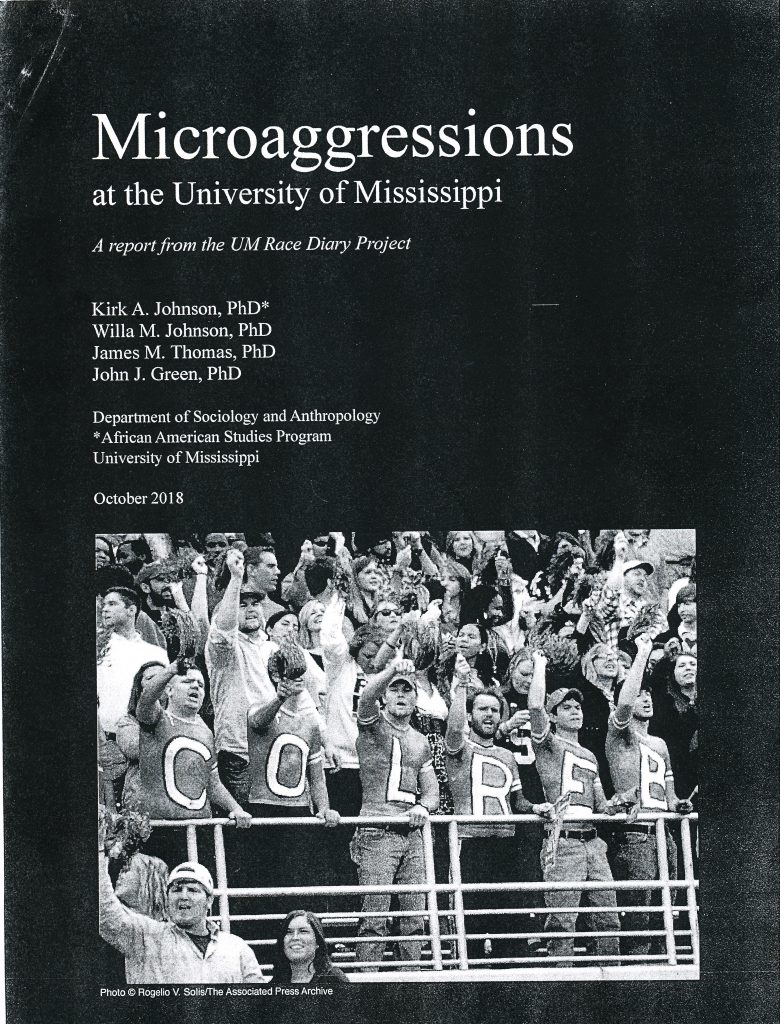Four UM sociology professors have published a report titled “Microaggressions at the University of Mississippi,” which analyzes nearly 1,400 entries from the UM Race Diary Project, drawing attention to bias-related incidents on- and off-campus. The reports collected during the 2014-15 academic year document specific references to Ole Miss students demonstrating racist, misogynist, homophobic and otherwise discriminatory behavior, often to no repercussions.
“During the 2014-2015 academic year, 621 undergraduate students reported 1,381 incidents of microaggressions involving microassaults (explicit putdowns), microinsults (unconscious rudeness and insensitivity), and microinvalidations (unconscious negation or nullification,)” the report’s summary reads.
The faculty researchers are Associate Professor of Sociology Willa Johnson, Assistant Professor of Sociology James Thomas, Professor of Sociology John Green and Associate Professor of Sociology and African American Studies Kirk Johnson. These professors, along with a team of 14 undergraduate and graduate students, collected anonymous responses online from Aug. 23, 2014, to April 23, 2015. Responses came from “621 students in undergraduate sociology, psychology, social work, political science and EDHE classes.” The process of coding and analyzing responses began in November 2016.
“These incidents occurred throughout the campus in classrooms, in Greek houses and dormitories, and in public spaces such as the Grove and the Student Union,” the report reads.

Leaders of the UM Race Diary Project released their final report, titled “Microaggressions at the University of Mississippi,” on Wednesday. Researchers began collecting data about the racial climate on campus in 2014.
Click here to read the full report from the UM Race Diary Project.
Students registered to participate in the reporting process online through a public link to a web page explaining the study’s purpose and inviting students to submit preliminary information before writing their first entries. This initial survey stated that the “diary of race-related events… can be troubling ones or positive ones.”
“We’re social scientists who are trying to raise awareness of discrimination at universities and find ways to create a more livable campus climate,” the professors wrote.
Though the majority of reports focus on negative interactions, the research group did receive some documentation of positive interactions.
“Some 67 (4.9 percent) entries spoke of students showing empathy and concern for persons in marginalized groups,” the report states.
A freshman student wrote an entry about how women in her dormitory acted kindly toward an “African-American student living on an otherwise all-white dorm floor.”
“The African-American has been accepted by everyone on the floor,” the freshman woman’s entry reads. “She is a sweet girl who we have all become friends with. I think since she was accepted, regardless of race, she never felt out of place. This is her university, too.”
However, the report shows that many entries reflect “the university’s reputation for intolerance” through “deliberate, purposeful discriminatory statements or actions.”
“The diaries contained 51 (3.7 percent) references to students being called n—er and 11 (.8 percent) incidents of females being called bi–h,” the report shows.
Researchers found that “in every case, microaggressors seemed to use (n—er) casually with little apparent regard for its incendiary potential…”
One student’s entry documents a group of people cheering after a racial slur was used in response to a football game on TV.
“There was a football game on, probably NFL. From down the hall, I hear someone, presumably white, yell ‘Get that n—er!’ followed by a bunch of voices cheering,” the entry reads.
The full report includes many similar entries and claims demonstrating that “racial and other tensions are a fixture of campus life at UM.”
“But (entries) also reveal behaviors that undercut the UM “brand,” a marketing concept that embodies tolerance, diversity and multiculturalism,” the report reads.
The study includes reports of off-campus incidents of bias as well. One student wrote about the discriminatory environment of bars on the Square and cited an instance of a gay friend being harassed at a bar.
“We were all goofing off, dancing and just having a good time when we were interrupted by an overly served guy. He was screaming jokes about my gay friend, calling him a f-g and just being really rude about his sexual preference.”
The report’s conclusion explains the researchers’ findings and outlines their recommendation on how the university can use this information to improve life on campus.
“In the absence of vigorous educational programs and rigorously enforced prosocial policies by the University, microaggressions will undoubtedly continue as arriving students find support for these ideas amongst their peers, within Greek houses, in classrooms, and in other public or private spaces on- or off-campus where archaic notions about ‘other’ groups thrive,” the researchers wrote.
The 621 students who responded represent 3 percent of the 23,096 students enrolled at UM in the 2014-15 academic year.






